Search Result
Results for "
antimitotic
" in MedChemExpress (MCE) Product Catalog:
2
Isotope-Labeled Compounds
| Cat. No. |
Product Name |
Target |
Research Areas |
Chemical Structure |
-
- HY-117371
-
|
(-)-Hemiasterlin; Milnamide B
|
ADC Cytotoxin
|
Cancer
|
|
Hemiasterlin ((-)-Hemiasterlin) is an antimitotic marine natural product with potent anticancer effcts. Hemiasterlin can be used as a cytotoxic payload (ADC Cytotoxin) in antibody-drug conjugates (ADCs) .
|
-
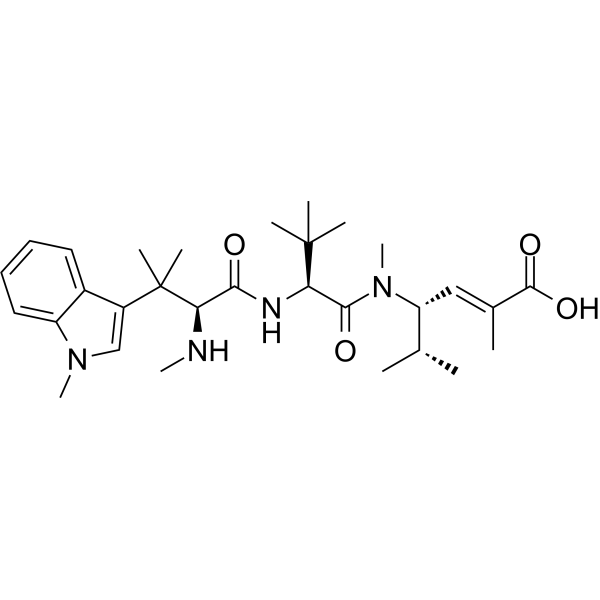
-
- HY-B0018
-
|
10-Acetyl docetaxel; PNU-101383
|
ADC Cytotoxin
|
Cancer
|
|
Docetaxal (10-Acetyl docetaxel) is an analog of Docetaxel (HY-B0011), with anticancer activity. Docetaxel is a microtubule disassembly inhibitor, with antimitotic activity .
|
-
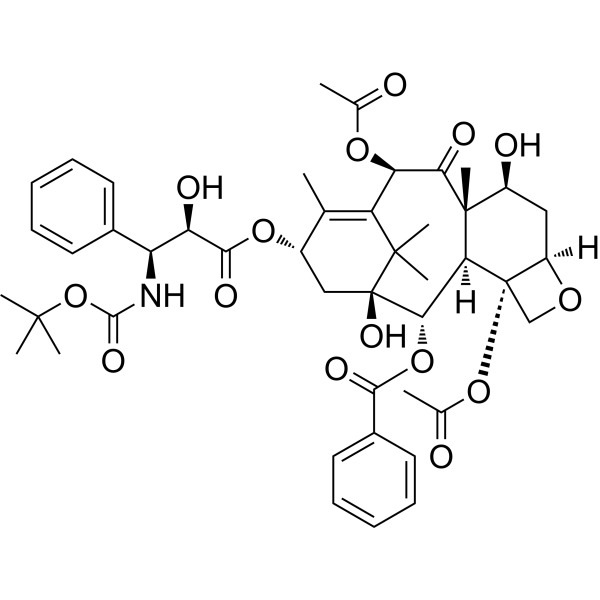
-
- HY-103711
-
|
|
Microtubule/Tubulin
|
Cancer
|
|
Estramustine is an antineoplastic agent. Estramustine depolymerizes microtnbules by binding to tubulin 1, exhibits antimitotic activity with an IC50 value of ~16 μM for mitosis of DU 145 cells. Estramustine blocks cells at mitosis in prostate tumor xenografts .
|
-
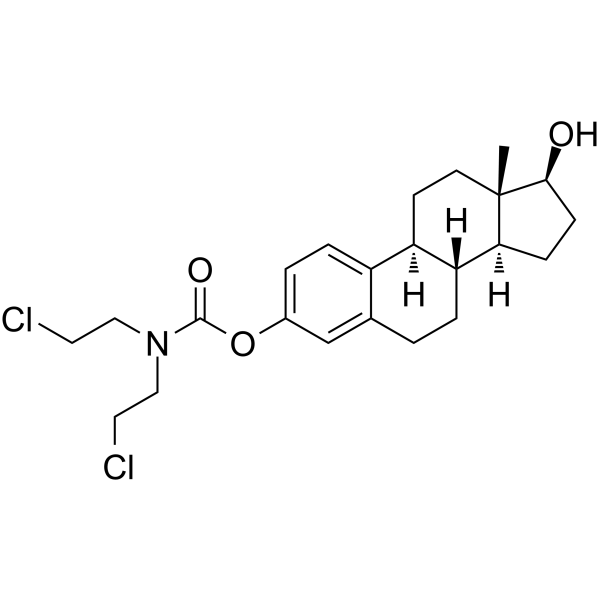
-
- HY-N9338
-
|
|
Others
|
Neurological Disease
|
|
Guattegaumerine is a bisbenzylisoquinoline alkaloid with antimitotic, cytotoxic and neuroprotective activities .
|
-
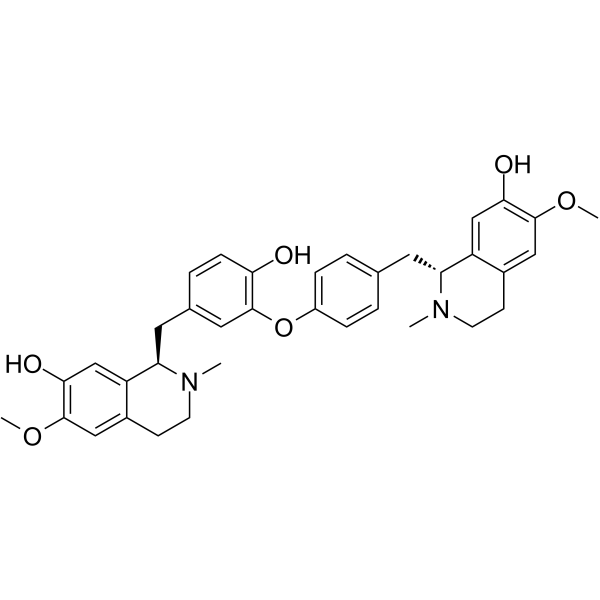
-
- HY-N10095
-
|
4′-O-Demethylchamaejasmenin B
|
Fungal
|
Infection
|
|
Sikokianin A is a biflavanone that can be isolated from the root of Stellera chamaejasme. Sikokianin A has antimitotic and antifungal activity to against Pyricularia oryzae .
|
-
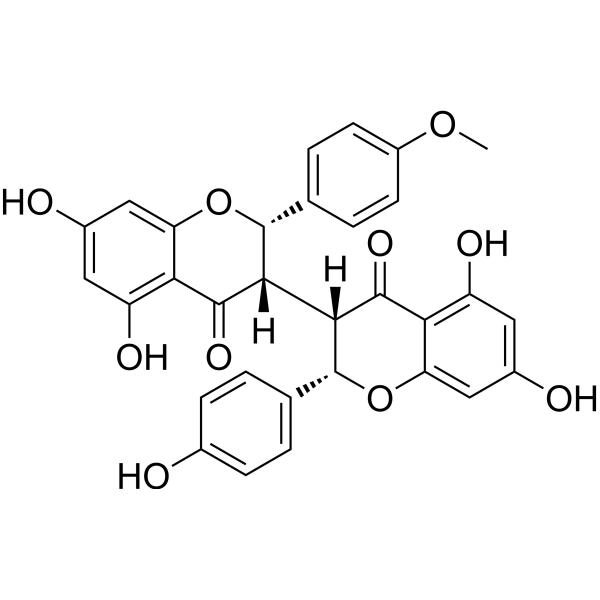
-
- HY-137977
-
DMU-212
1 Publications Verification
|
ERK
Apoptosis
|
Cancer
|
|
DMU-212 is a methylated derivative of Resveratrol (HY-16561), with antimitotic, anti-proliferative, antioxidant and apoptosis promoting activities. DMU-212 induces mitotic arrest via induction of apoptosis and activation of ERK1/2 protein. DMU-212 has orally active .
|
-
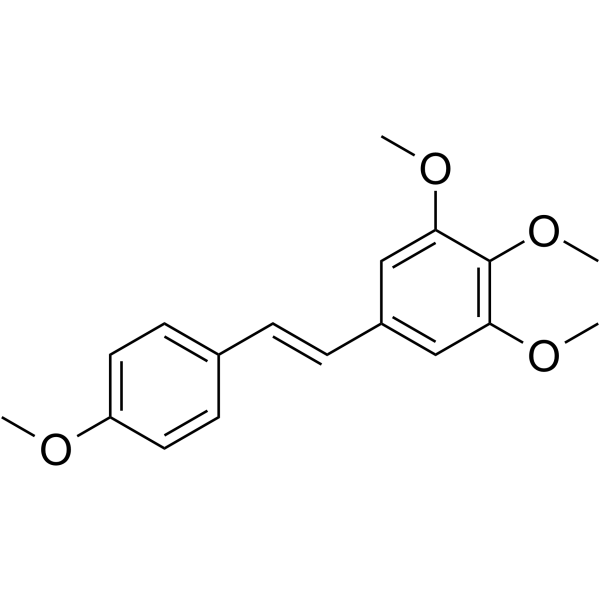
-
- HY-15482
-
D-64131
1 Publications Verification
|
Microtubule/Tubulin
|
Cancer
|
|
D-64131 is an orally active tubulin inhibitor, with an IC50 of 0.53 μM for tubulin polymerization. D-64131 has antimitotic activity. D-64131 can be used for cancer research .
|
-
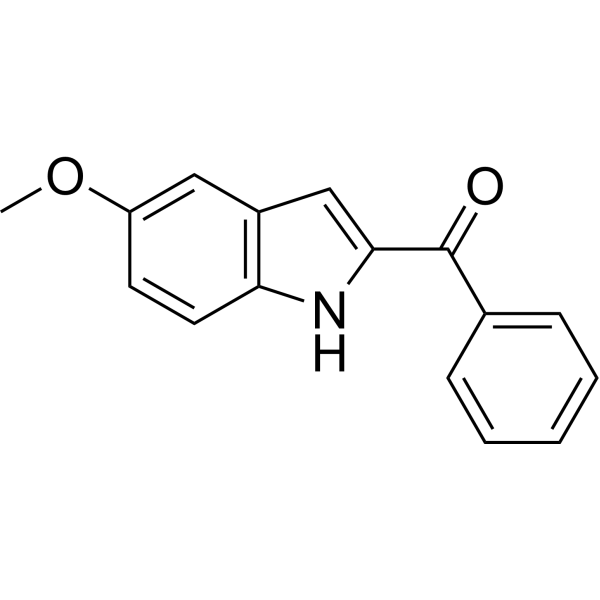
-
- HY-103257
-
|
NSC656158
|
Microtubule/Tubulin
|
Cancer
|
|
CHM-1, a microtubule-destabilizing agent, inhibits tubulin polymerization. CHM-1 is a potent and selective antimitotic antitumor activity against human hepatocellular carcinoma. CHM-1 induces growth inhibition and apoptosis via G2-M phase arrest in human hepatocellular carcinoma cells by activation of Cdc2 kinase activity .
|
-
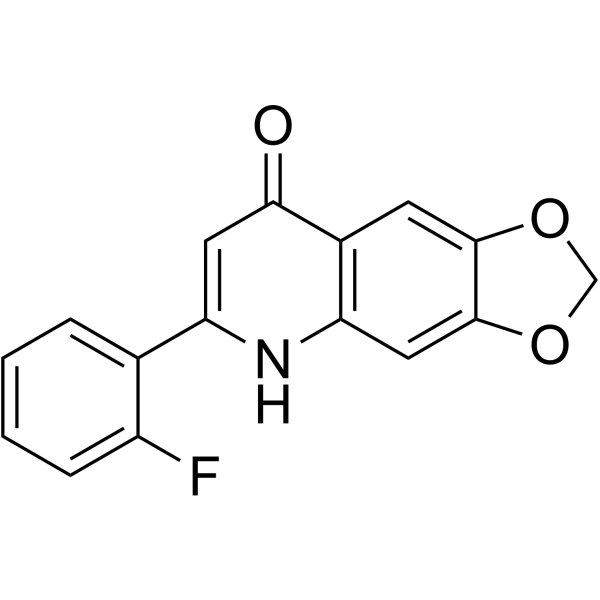
-
- HY-149374
-
|
|
Microtubule/Tubulin
|
Cancer
|
|
Tubulin inhibitor 36 (Compound 10) is a novel and potent tubulin inhibitor and inhibits the polymerization of microtubular protein then induces apoptosis with an IC50 value of 1.5±0.1 μM. Tubulin inhibitor 36 (Compound 10) has significant anti-mitotic effect and exhibits activities against glioblastoma cells. Tubulin inhibitor 36 (Compound 10) has anti-tumor effects and can be used for glioblastoma multiforme (GBM) research .
|
-
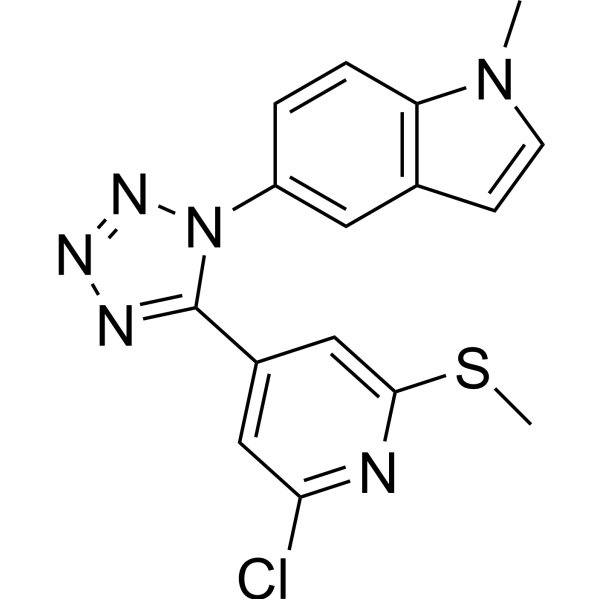
-
- HY-125124
-
-
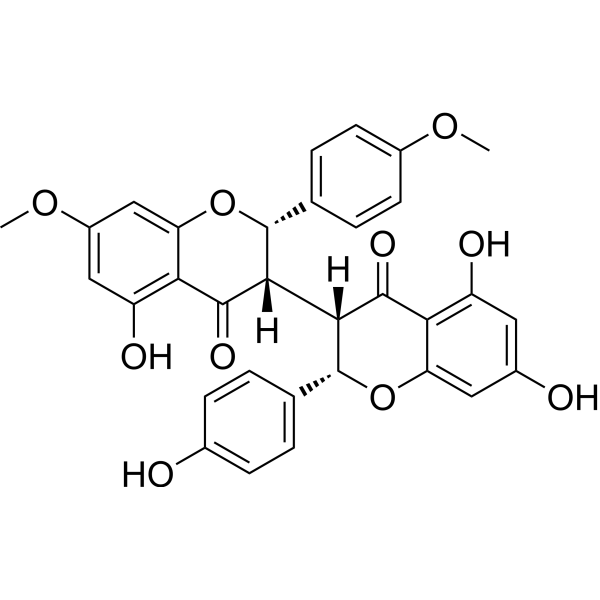
-
- HY-15580
-
-
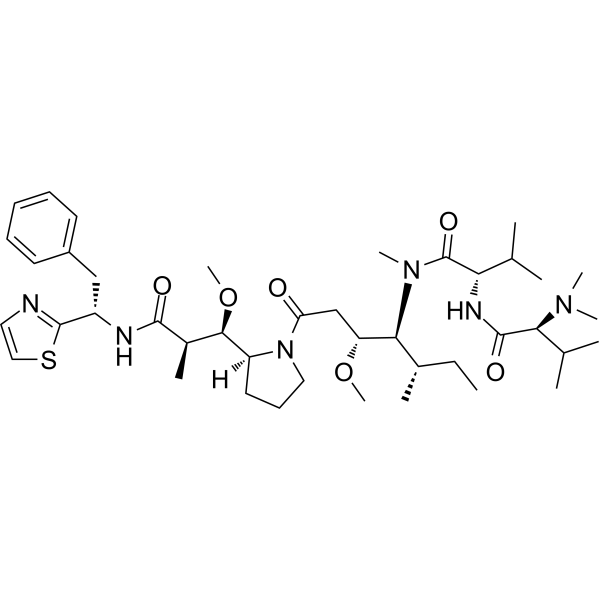
-
- HY-147006
-
|
|
Others
|
Cancer
|
|
MT-VC-ZD02044 is a cytotoxic and anti-mitotic agent .
|
-
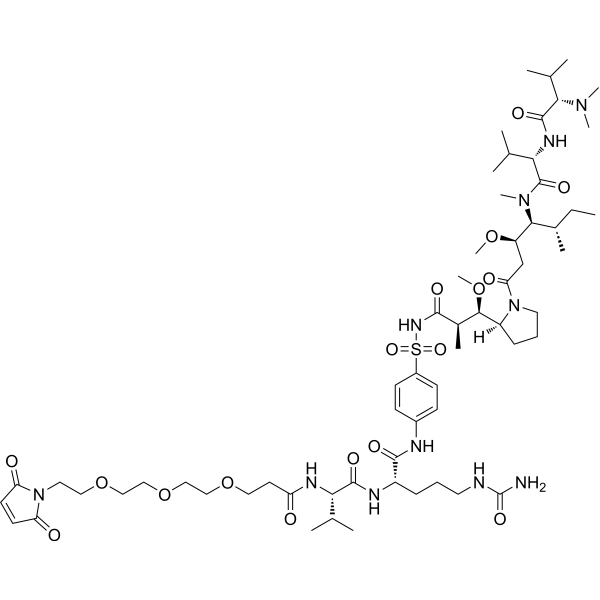
-
- HY-12053A
-
|
KW-2307; Nor-5'-anhydrovinblastine ditartrate
|
Microtubule/Tubulin
Autophagy
|
Cancer
|
|
Vinorelbine (ditartrate) is an anti-mitotic agent which inhibits the proliferation of Hela cells with IC50 of 1.25 nM.
|
-
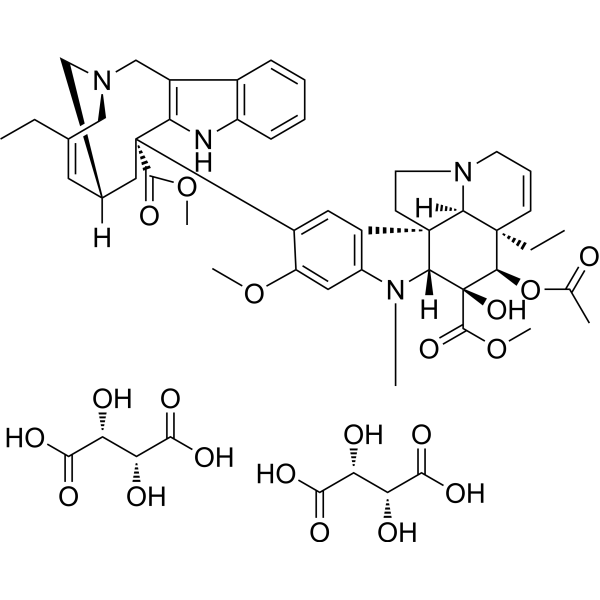
-
- HY-13760
-
|
ILX651
|
Microtubule/Tubulin
|
Cancer
|
|
Tasidotin hydrochloride is a peptide analog of the antimitotic depsipeptide dolastatin 15, as an inhibitor of microtubule assembly and microtubule dynamics.
|
-
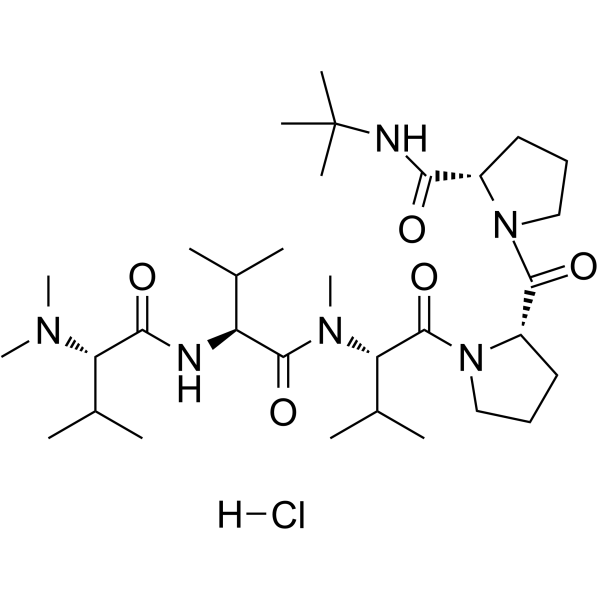
-
- HY-N0516
-
|
Vitexicarpin
|
STAT
|
Inflammation/Immunology
|
|
Casticin is a methyoxylated flavonol isolated from Vitex rotundifolia, with antimitotic and anti-inflammatory effect. Casticin inhibits the activation of STAT3.
|
-
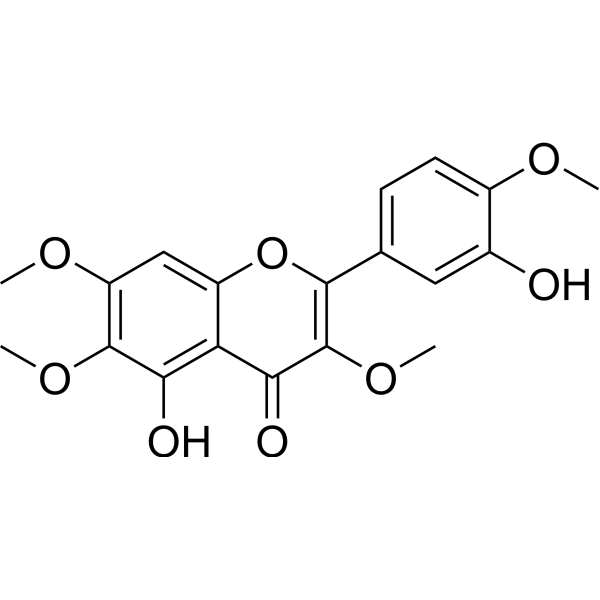
-
- HY-N2500
-
|
|
Microtubule/Tubulin
Apoptosis
Autophagy
|
Infection
Cardiovascular Disease
|
|
Deoxypodophyllotoxin (DPT), a derivative of podophyllotoxin, is a lignan with potent antimitotic, anti-inflammatory and antiviral properties isolated from Anthriscus sylvestris. Deoxypodophyllotoxin, targets the microtubule, has a major impact in oncology not only as anti-mitotics but also as potent inhibitors of angiogenesis . Deoxypodophyllotoxin induces cell autophagy and apoptosis . Deoxypodophyllotoxin evokes increase of intracellular Ca 2+ concentrations in DRG neurons .
|
-
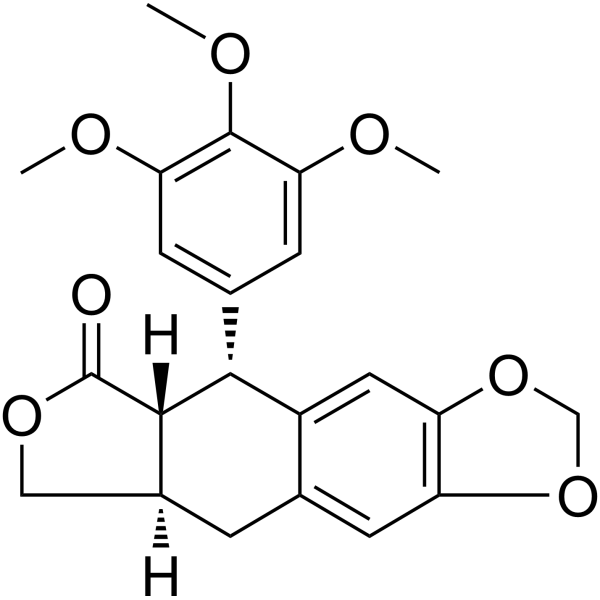
-
- HY-121989
-
|
(Z)-3,5,4'-Trimethoxystilbene
|
Microtubule/Tubulin
|
Cancer
|
|
Cis-trismethoxy resveratrol is a potent anti-mitotic reagent.Cis-trismethoxy resveratrol inhibits tubulin polymerization with an IC50 value of 4 μM .
|
-
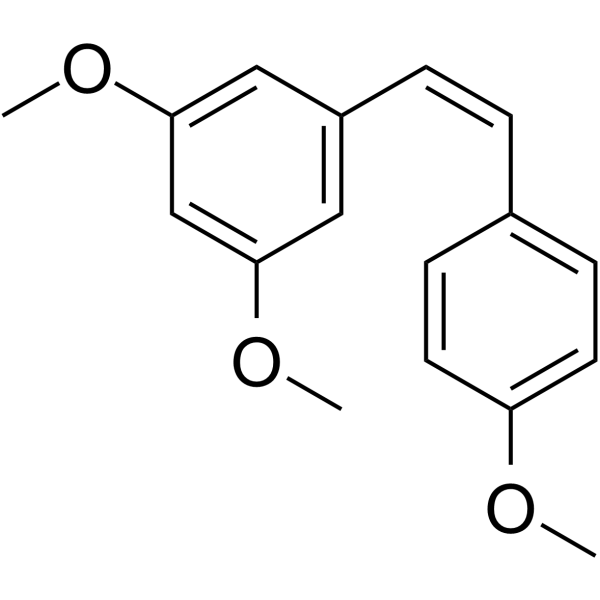
-
- HY-12053AS
-
|
KW-2307-d3 ditartrate; Nor-5'-anhydrovinblastine-d3 ditartrate
|
Microtubule/Tubulin
Autophagy
|
Cancer
|
|
Vinorelbine-d3 (ditartrate) is the deuterium labeled Vinorelbine ditartrate. Vinorelbine (ditartrate) is an anti-mitotic agent which inhibits the proliferation of Hela cells with IC50 of 1.25 nM.
|
-
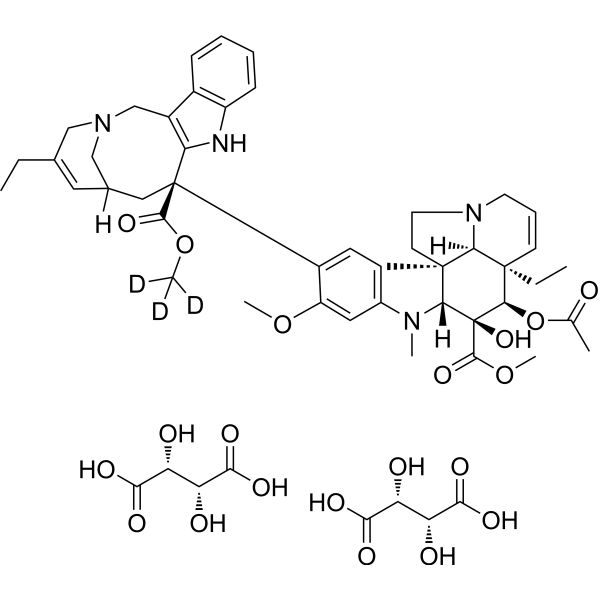
-
- HY-N6997
-
|
|
Microtubule/Tubulin
|
Cancer
|
|
Ceratamine A is an antimitotic heterocyclic alkaloid isolated from the marine sponge Pseudoceratina sp., acts as a microtubule-stabilizing agent. Ceratamine A exhibits cytotoxicity against human cancer cell lines .
|
-
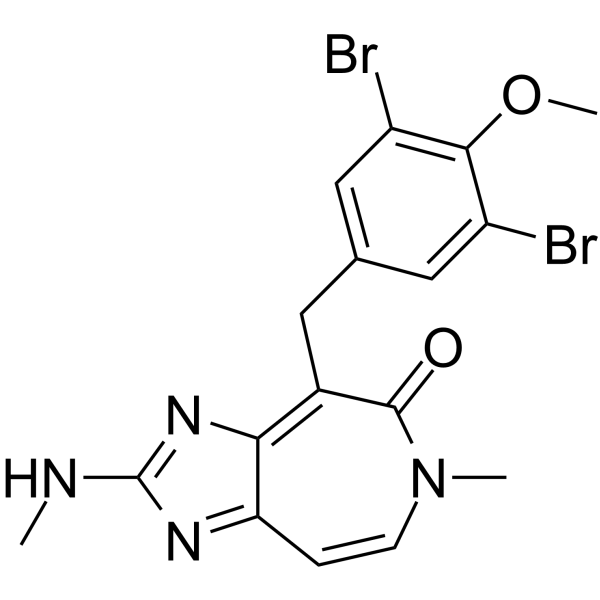
-
- HY-160702
-
|
|
Drug-Linker Conjugates for ADC
|
Cancer
|
|
DMBA-SIL-Mal-MMAE is a cytotoxin-linker conjugate for ADC with potent antitumor activity by using the anti-mitotic agent, monomethyl auristatin E (MMAE, a tubulin inhibitor), linked DMBA-SIL-Mal .
|
-
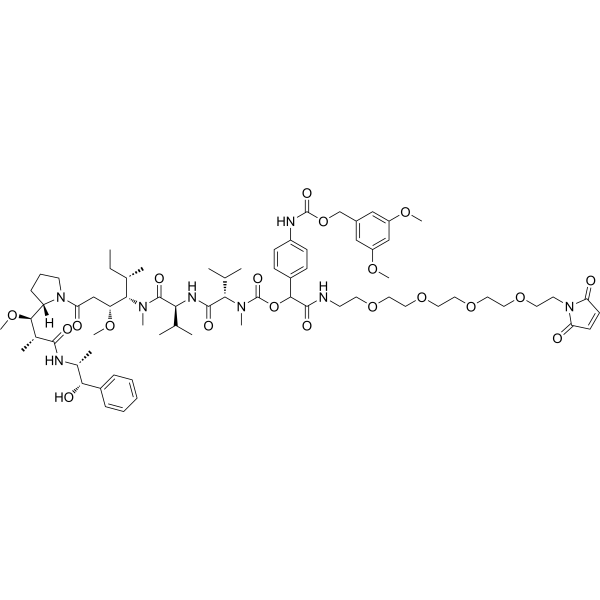
-
- HY-100566
-
|
|
Drug-Linker Conjugates for ADC
|
Cancer
|
|
SuO-Val-Cit-PAB-MMAE is a agent-linker conjugate for ADC by using the anti-mitotic agent, monomethyl auristatin E (MMAE, a tubulin inhibitor), linked via the peptide SuO-Val-Cit-PAB .
|
-
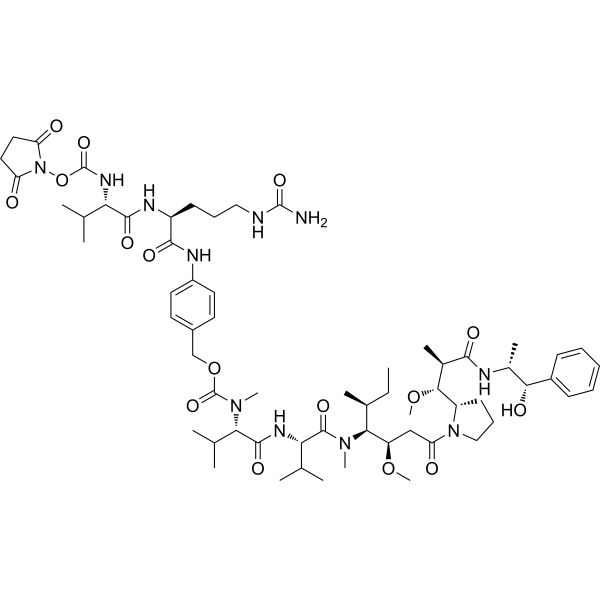
-
- HY-126681
-
|
|
Drug-Linker Conjugates for ADC
|
Cancer
|
|
SC-VC-PAB-MMAE is a agent-linker conjugate for ADC with potent antitumor activity by using the anti-mitotic agent, monomethyl auristatin E (MMAE, a tubulin inhibitor), linked via the cleavable linker SC-VC-PAB .
|
-
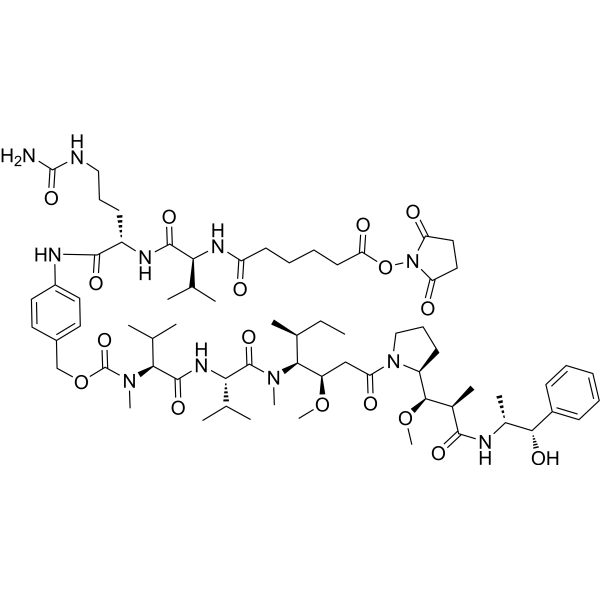
-
- HY-15575
-
VcMMAE
Maximum Cited Publications
44 Publications Verification
MC-Val-Cit-PAB-MMAE; mc-vc-PAB-MMAE
|
Drug-Linker Conjugates for ADC
Microtubule/Tubulin
|
Cancer
|
|
VcMMAE (mc-vc-PAB-MMAE) is a agent-linker conjugate for ADC with potent antitumor activity by using the anti-mitotic agent, monomethyl auristatin E (MMAE, a tubulin inhibitor), linked via the lysosomally cleavable dipeptide, valine-citrulline (vc).
|
-
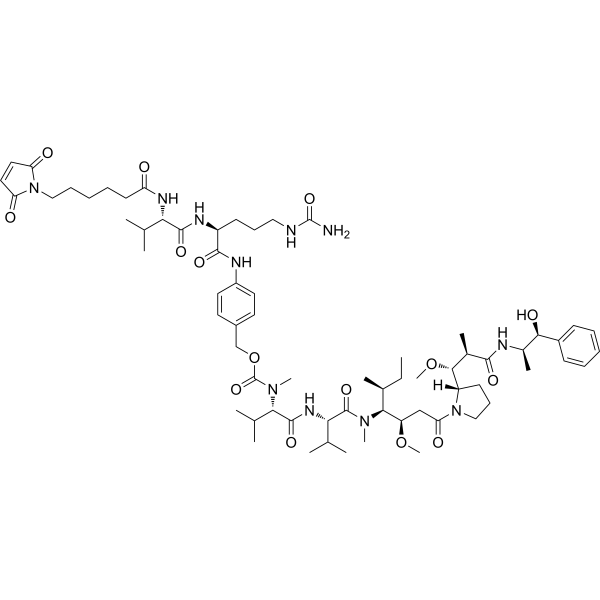
-
- HY-N1255
-
|
(-)-Scoulerine; Discretamine
|
Microtubule/Tubulin
Beta-secretase
Apoptosis
|
Cancer
|
|
Scoulerine ((-)-Scoulerine), an isoquinoline alkaloid, is a potent antimitotic compound. Scoulerine is also an inhibitor of BACE1 (ß-site amyloid precursor protein cleaving enzyme 1). Scoulerine inhibits proliferation, arrests cell cycle, and induces apoptosis in cancer cells .
|
-
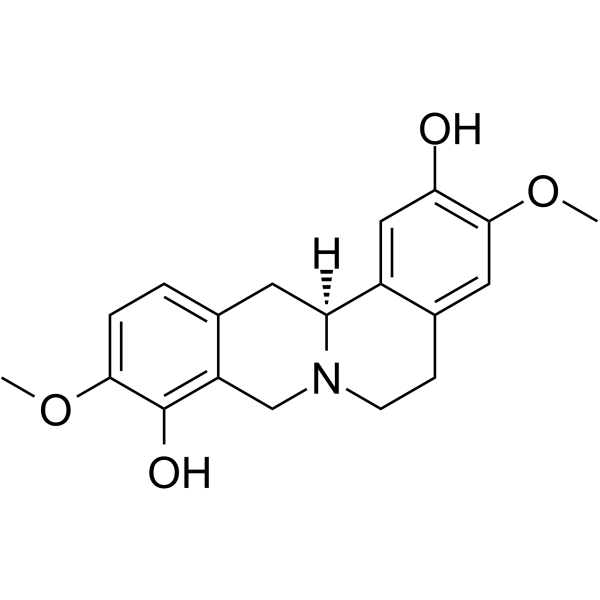
-
- HY-P99593A
-
|
DMUC5754A (solution)
|
Antibody-Drug Conjugates (ADCs)
|
Cancer
|
|
Sofituzumab vedotin (DMUC5754A) (solution) is an antibody-drug conjugate (ADC) that contains the humanized IgG1 anti-MUC16 monoclonal antibody and a potent anti-mitotic agent, monomethyl auristatin E (MMAE), linked through a protease-cleavable linker .
|
-

-
- HY-155962
-
|
|
Microtubule/Tubulin
|
Cancer
|
|
Tubulin polymerization-IN-47 (Compound 4h) is a tubulin polymerization inhibitor and mitotic inhibitor. Tubulin polymerization-IN-47 inhibits neuroblastoma cancer cell proliferation, with IC50s of 7 and 12 nM for Chp-134 and Kelly cell line .
|
-
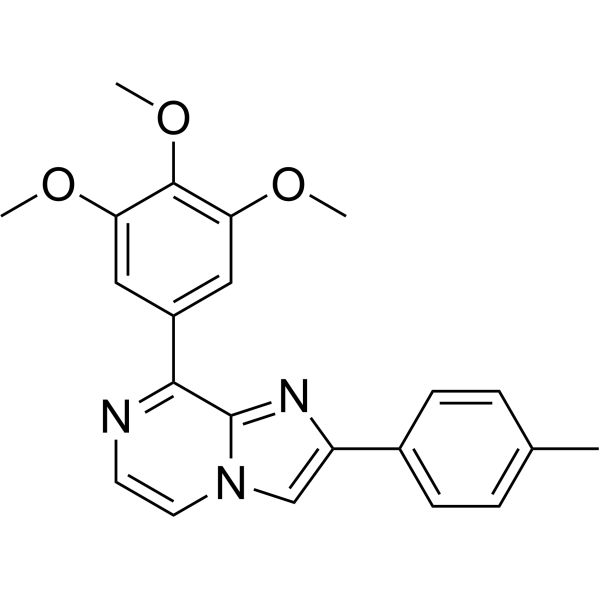
-
- HY-155963
-
|
|
Microtubule/Tubulin
|
Cancer
|
|
Tubulin polymerization-IN-48 (Compound 4k) is a tubulin polymerization inhibitor. Tubulin polymerization-IN-48 has a moderate effect on disruption of the microtubule network. Tubulin polymerization-IN-48 inhibits neuroblastoma cancer cell proliferation, with IC50s of 79 and 165 nM for Chp-134 and Kelly cell line .
|
-
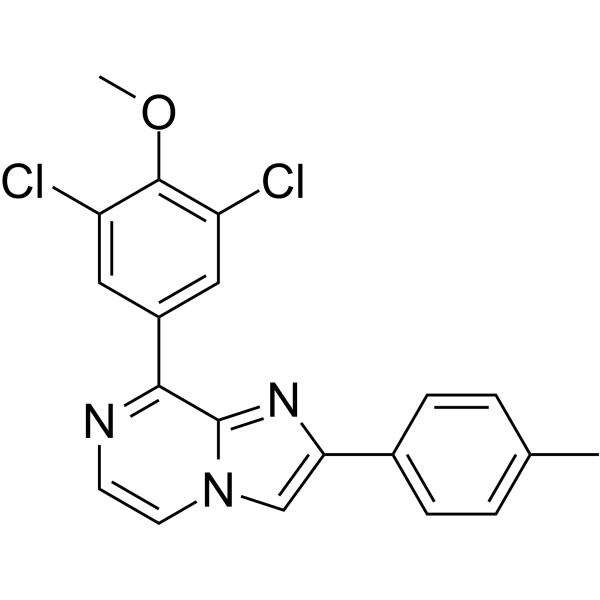
-
- HY-N0282
-
|
Demecolcine
|
Microtubule/Tubulin
Apoptosis
|
Inflammation/Immunology
Cancer
|
|
Colcemid (Demecolcine) is a potent mitotic inhibitor with an IC50 value of 2.4 μM for inhibition of tubulin polymerization. Colcemid (Demecolcine) can interact with tubulin dimers to induce anti-mitotic action and inhibit microtubule growth. Colcemid (Demecolcine) can be used for inflammatory disorders and cancer research .
|
-
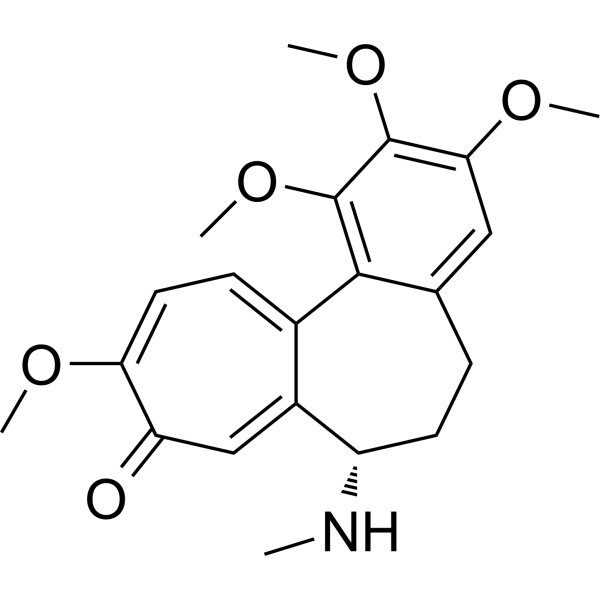
-
- HY-P1126
-
|
DLS 15
|
Microtubule/Tubulin
ADC Cytotoxin
Apoptosis
|
Cancer
|
|
Dolastatin 15 (DLS 15), a depsipeptide derived from Dolabella auricularia, is a potent antimitotic agent structurally related to the antitubulin agent Dolastatin 10. Dolastatin 15 induces cell cycle arrest and apoptosis in multiple myeloma cells. Dolastatin 15 can be used as an ADC cytotoxin .
|
-
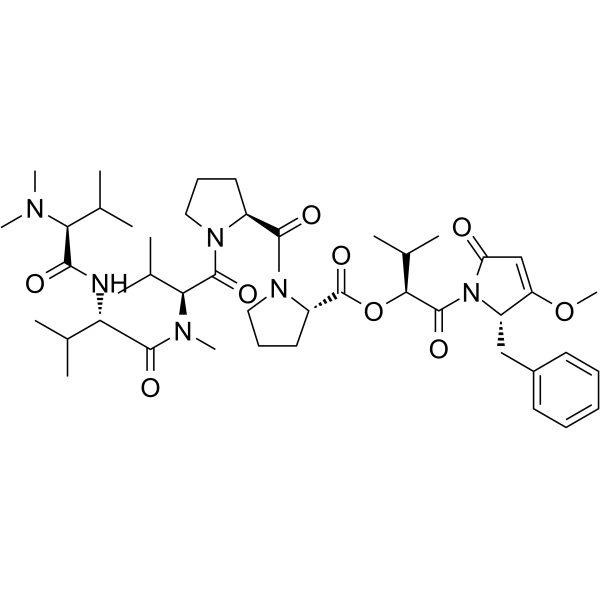
-
- HY-148870
-
|
|
ADC Cytotoxin
|
Cancer
|
|
Maytansinoid B is a kind of ADC Cytotoxin. Maytansinoid B can be used to conjugates with antibodies to form antibody-drug conjugates (ADCs). Maytansinoids are known as antimitotic agents, binding to tubulin and inhibiting microtubule assembly. Maytansinoids induces G2/M arrest in the cell cycle to induce apoptosis .
|
-
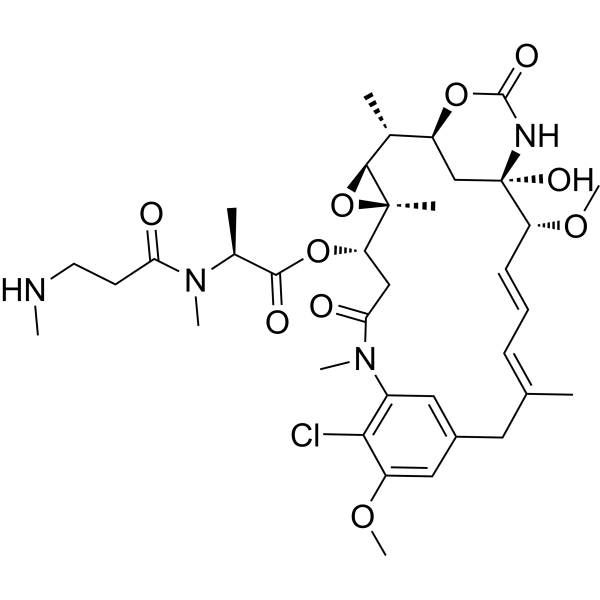
-
- HY-15575S
-
|
MC-Val-Cit-PAB-MMAE-d8; mc-vc-PAB-MMAE-d8
|
Drug-Linker Conjugates for ADC
Microtubule/Tubulin
|
Cancer
|
|
VcMMAE-d8 is an isotope of VcMMAE (HY-15575). VcMMAE-d8 is a agent-linker conjugate for ADC with potent antitumor activity by using the anti-mitotic agent, monomethyl auristatin E (MMAE, a tubulin inhibitor), linked via the lysosomally cleavable dipeptide, valine-citrulline (vc) .
|
-
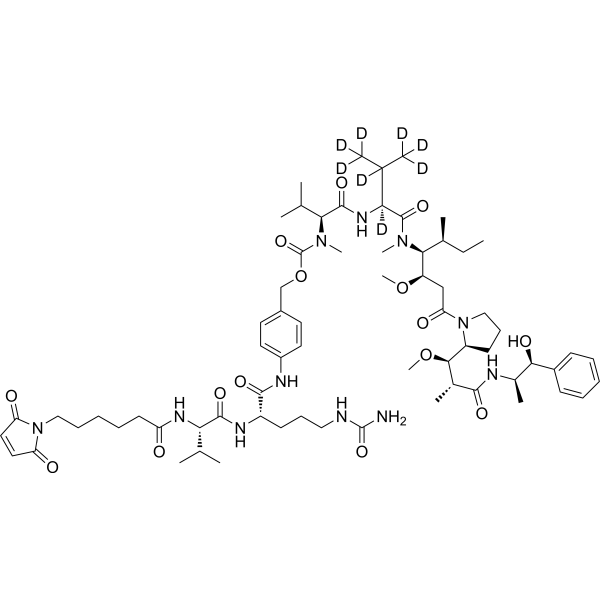
-
- HY-14389
-
|
|
Microtubule/Tubulin
|
Cancer
|
|
LP-261 is a potent and orally active anti-mitotic agent and shows an inhibition of in vitro tubulin polymerization with an EC50 of 3.2 μM . LP-261 inhibits growth of a human non-small-cell lung tumor (NCI-H522) in vivo and can be used for cancer research .
|
-
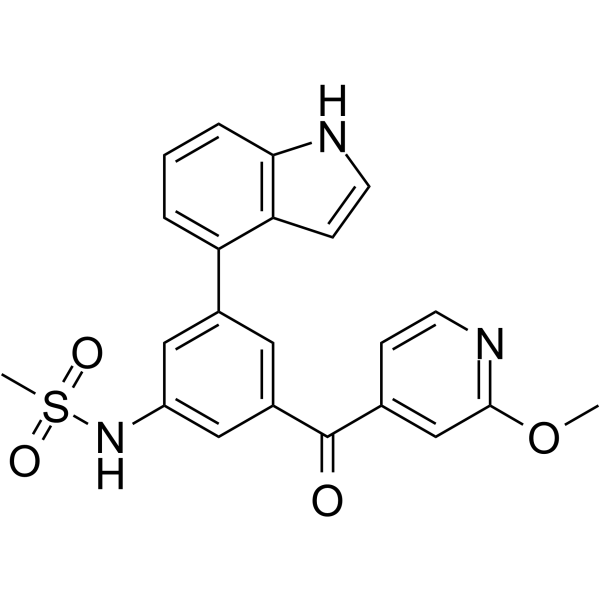
-
- HY-147193
-
|
|
NAMPT
|
Cancer
|
|
Nampt-IN-10 TFA (compound 4) is a Nicotinamide Phosphoribosyltransferase (NAMPT) inhibitor. Nampt-IN-10 TFA shows cellular potency to A2780 and CORL23 cells lines with IC50s of 5 and 19 nM, respectively. Nampt-IN-10 TFA can be used as a novel non-antimitotic payload for ADCs .
|
-
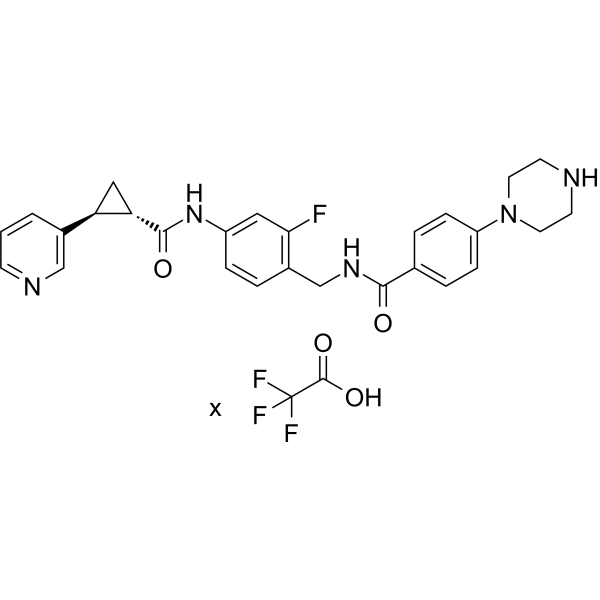
-
- HY-147193A
-
|
|
NAMPT
|
Cancer
|
|
Nampt-IN-10 trihydrochloride (compound 4) is a Nicotinamide Phosphoribosyltransferase (NAMPT) inhibitor. Nampt-IN-10 trihydrochloride shows cellular potency to A2780 and CORL23 cell lines with IC50 values of 5 and 19 nM, respectively. Nampt-IN-10 trihydrochloride can be used as a novel non-antimitotic payload for antibody-drug conjugate (ADC) .
|
-
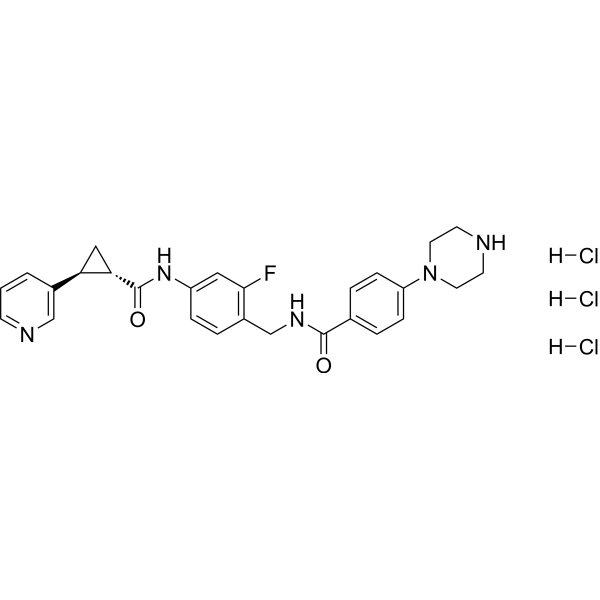
-
- HY-14621
-
|
Vanillylacetone; Gingerone
|
NF-κB
|
Metabolic Disease
Inflammation/Immunology
Cancer
|
|
Zingerone (Vanillylacetone) is a nontoxic methoxyphenol isolated from Zingiber officinale, with potent anti-inflammatory, antidiabetic, antilipolytic, antidiarrhoeic, antispasmodic and anti-tumor properties . Zingerone alleviates oxidative stress and inflammation, down-regulates NF-κB mediated signaling pathways . Zingerone acts as an anti-mitotic agent, and inhibits the growth of neuroblastoma cells .
|
-
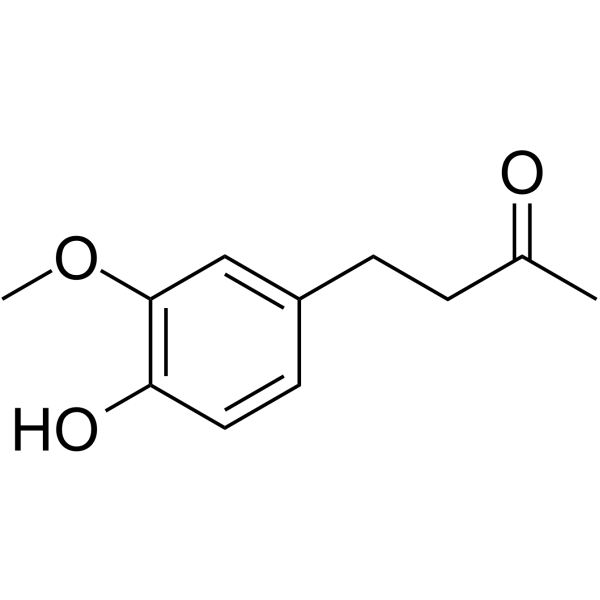
-
- HY-N10958
-
|
|
Fungal
HIV
Microtubule/Tubulin
|
Infection
|
|
Wikstrol A is a potent antifungal, antimitotic and anti-HIV-1 Agent. Wikstrol A induces morphological deformation of P. oryzae mycelia with an MMDC value of 70.1 µM. Wikstrol A shows activity against microtubule polymerization with an IC50 value of 131 µM. Wikstrol A shows anti-HIV-1 activity with an IC50 value of 67.8 µM .
|
-
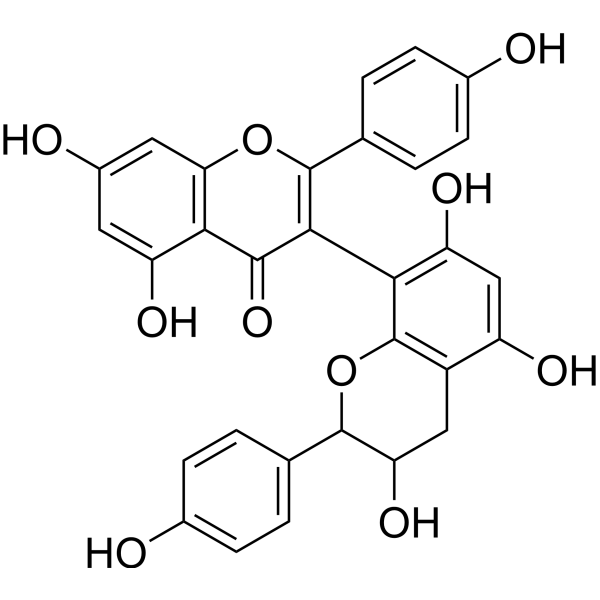
-
- HY-148595
-
|
|
Cytochrome P450
|
Cancer
|
|
Antitumor agent-88 exhibits potent antimitotic activity and arrests cell in the G2/M phase. Antitumor agent-88 disrupts the microtubule and the cytoskeleton in CYP1A1-expressing breast cancer cells. Antitumor agent-88 is also a competitive inhibitor of CYP1A1 (Ki: 1.4 μM) .
|
-
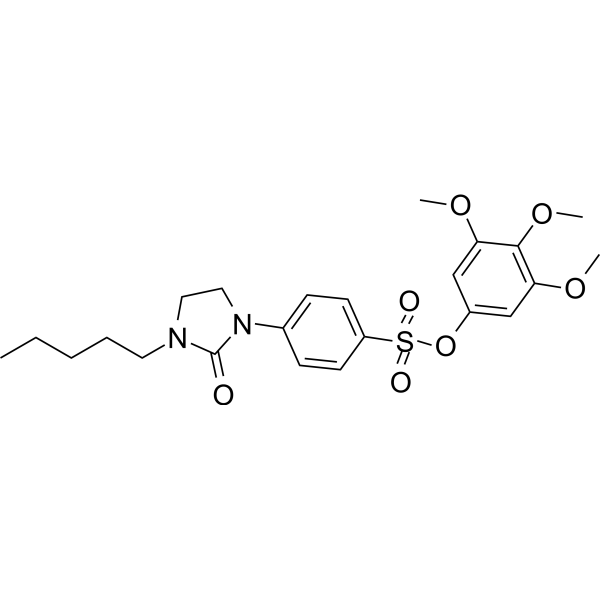
-
- HY-107545
-
|
|
Dynamin
|
Cancer
|
|
Dynole 34-2 is a dynamin GTPase inhibitor (IC50s=6.9 and 14.2 µM for dynamin1 and dynamin2 GTPase activity, respectively) with antimitotic effect. Dynole 34-2 induces apoptosis, as revealed by cell blebbing, DNA fragmentation, and PARP cleavage . Dynole 34-2 also potently inhibits receptor mediated endocytosis (RME) .
|
-
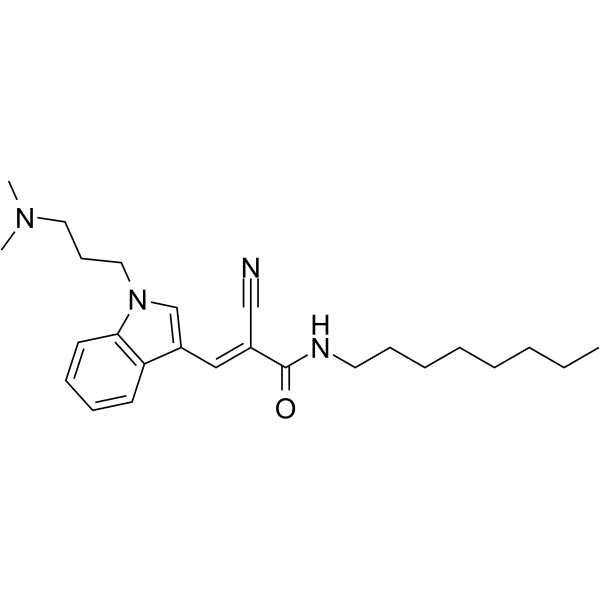
-
- HY-12401A
-
|
|
Mps1
|
Cancer
|
|
Mps1-IN-3 hydrochloride is a potent and selective Mps1 inhibitor with an IC50 value of 50 nM. Mps1-IN-3 hydrochloride can inhibit the proliferation of glioblastoma cells, and effectively sensitizes glioblastomas to Vincristine in orthotopic glioblastoma xenograft model .
|
-
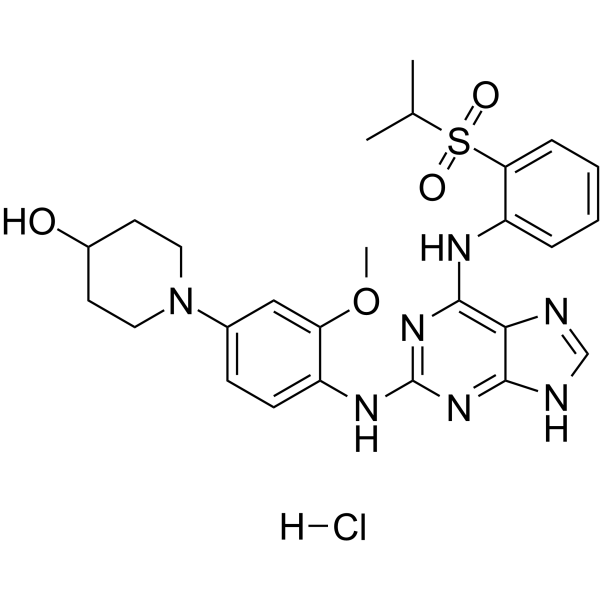
-
- HY-143660
-
|
|
Microtubule/Tubulin
Apoptosis
|
Cancer
|
|
LG308 is a novel synthetic compound with antimicrotubule activity. LG308 induces mitotic phase arrest and inhibits G2/M progression significantly which is associated with the upregulation of cyclin B1 and mitotic marker MPM-2 and the dephosphorylation of cdc2. LG308 also induces apoptosis and cell death. LG308 significantly suppresses tumor growth. LG308 with antimitotic activity has the potential for the research of prostate cancer .
|
-
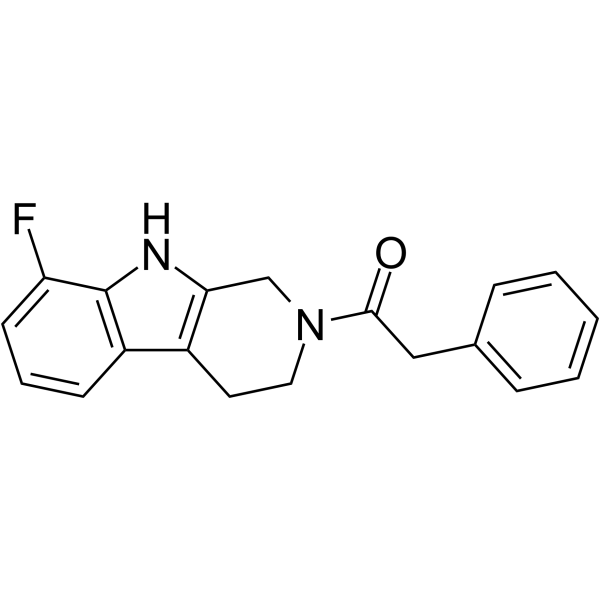
-
- HY-156088
-
|
|
Microtubule/Tubulin
Apoptosis
|
Cancer
|
|
SSE1806 is a derivative of podophyllotoxin (a natural antimitotic agent) and a microtubule/tubulin inhibitor with significant anticancer and antiproliferative activities. The GI50 of SSE1806 on cancer cell growth ranges from 1.29-21.15 μM. SSE1806 causes mitotic abnormalities and G2/M phase arrest, increases p53 expression, and inhibits colon cancer organoid growth. SSE1806 is able to overcome multidrug resistance in cell lines overexpressing MDR-1 .
|
-
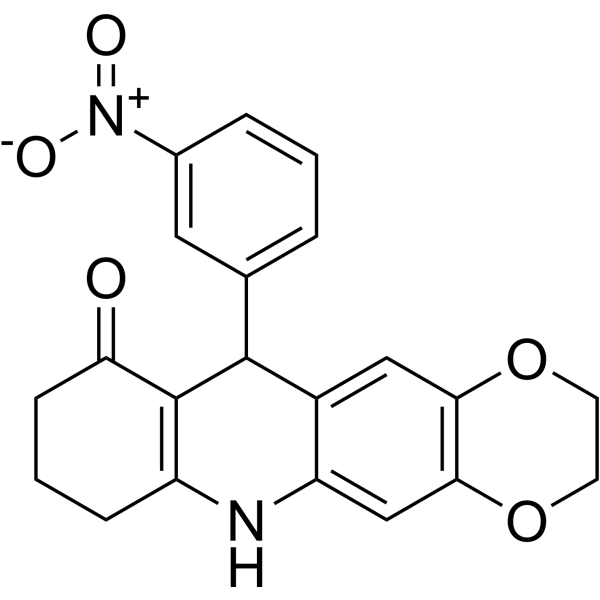
-
- HY-400684
-
|
|
Others
|
Cancer
|
|
Tubulysin A intermediate-1 is an intermediate in the synthesis of the cytotoxic peptide Tubulysin A (HY-15995). Tubulysin A (TubA) is an antibiotic, anti-microtubule toxins, and apoptosis inducer isolated from myxobacteria. Tubulysin A has anti-angiogenic, anti-microtubule, anti-mitotic, and anti-proliferative activities. Tubulysin A arrests cells in the G2/M phase, effectively inhibits tubulin polymerization, and induces depolymerization of detached microtubules. Tubulysin A acts as an ADC cytotoxin (ADC Cytotoxin) to synthesize ADC .
|
-
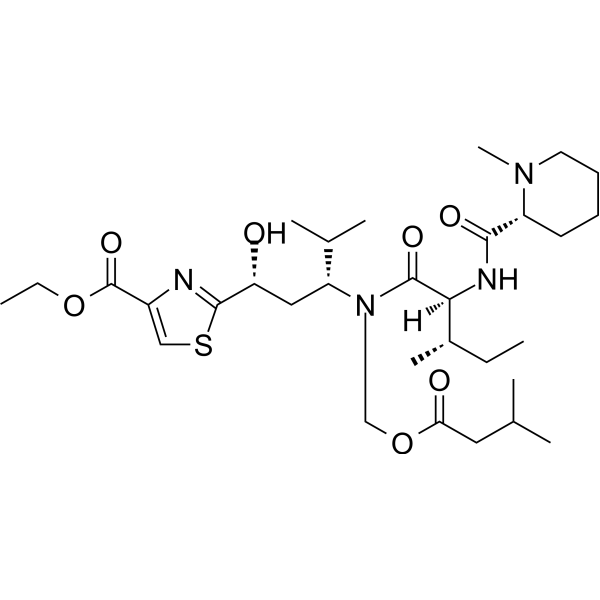
-
- HY-149376
-
|
|
Microtubule/Tubulin
|
Cancer
|
|
Tubulin inhibitor 38 (compound 14) is a tetrazole-based Tubulin inhibitor with antiproliferative potencies. Tubulin inhibitor 38 (100 nM,24 h) mediates mitotic arrest,blocks cell cycle at G2/M phase and induces apoptosis. Tubulin inhibitor 38 exhibits high cytotoxicity with high selectivity index among HeLa,MCF7,and U87 MG cells .
|
-
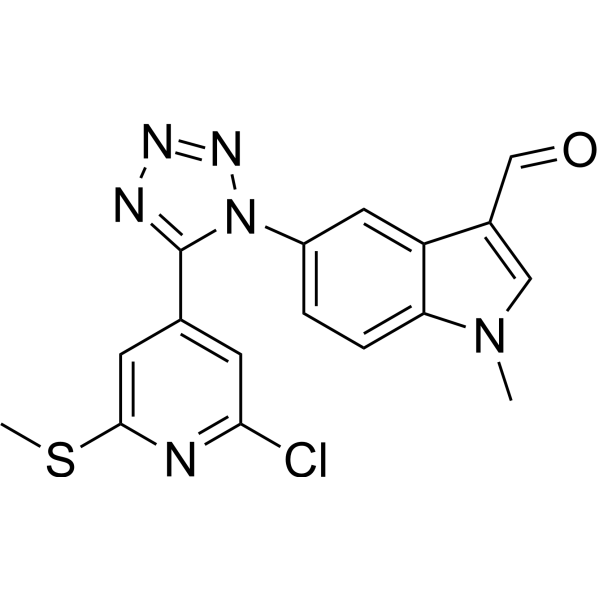
-
- HY-155841
-
|
|
Microtubule/Tubulin
|
Cancer
|
|
Tubulin polymerization-IN-46 (compound 9q) is a microtubule/Tubulin inhibitor that inhibits tubulin polymerization and induces apoptosis. Tubulin polymerization-IN-46 inhibits mitosis and arrests MCF-7 cells in the G2/M phase. Tubulin polymerization-IN-46 has anti-proliferative activity against MCF-7 breast cancer cells with an IC50 of 10 nM .
|
-
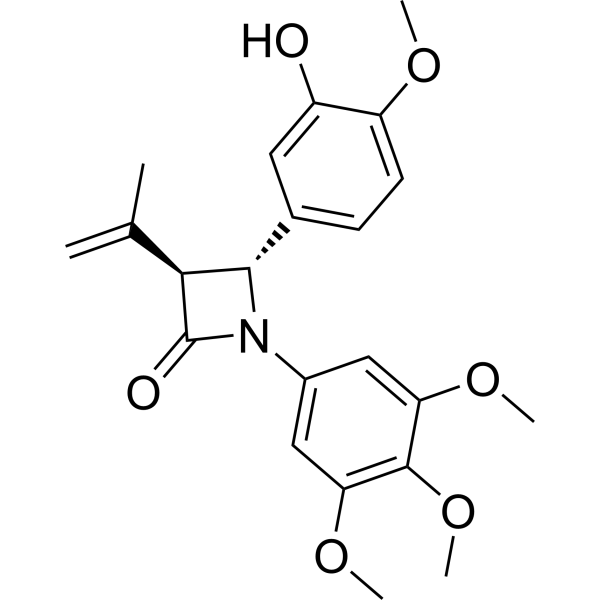
-
- HY-13563
-
|
T138067
|
Microtubule/Tubulin
Apoptosis
|
Cancer
|
|
Batabulin (T138067) is an antitumor agent, which binds covalently and selectively to a subset of the β-tubulin isotypes, thereby disrupting microtubule polymerization. Batabulin affects cell morphology and leads to cell-cycle arrest ultimately induces apoptotic cell death .
|
-
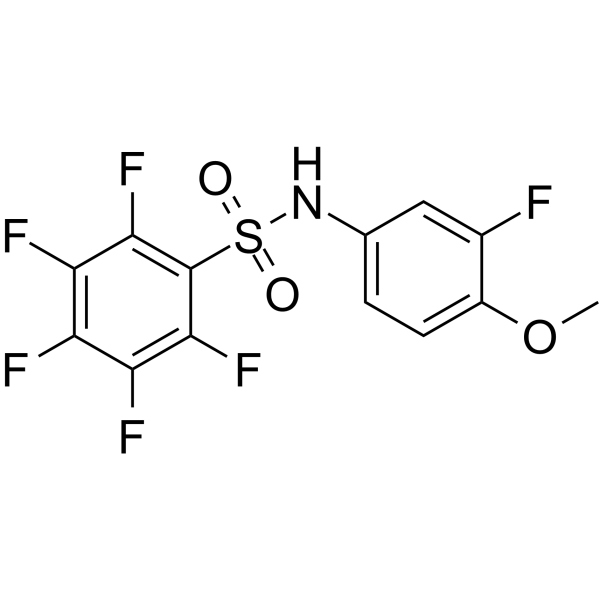
-
- HY-13563A
-
|
T138067 sodium
|
Microtubule/Tubulin
Apoptosis
|
Cancer
|
|
Batabulin sodium (T138067 sodium) is an antitumor agent, which binds covalently and selectively to a subset of the β-tubulin isotypes, thereby disrupting microtubule polymerization. Batabulin sodium affects cell morphology and leads to cell-cycle arrest ultimately induces apoptotic cell death .
|
-
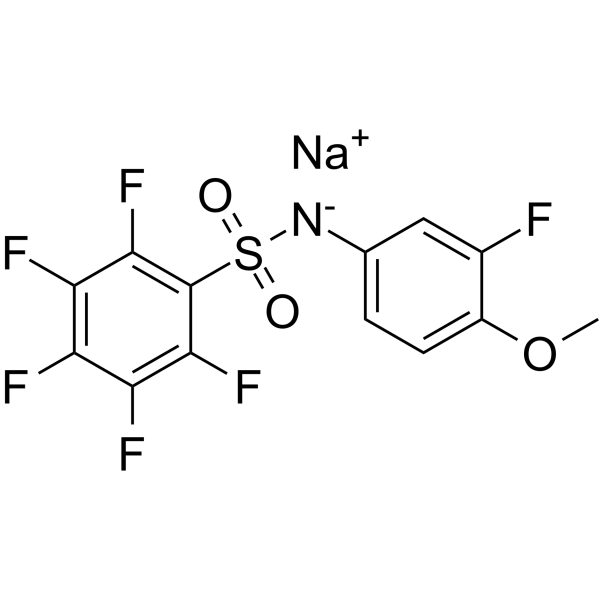
-
- HY-13270
-
|
E7010
|
Microtubule/Tubulin
Autophagy
Apoptosis
|
Cancer
|
|
ABT-751 (E7010) is a novel, highly orally bioavailable sulfonamides antimitotic compound and tubulin binder. It prevents tubulin aggregation by binding to the colchicine site on β-tubulin, leading to cell cycle arrest in G2/M phase and inducing apoptosis, thus effectively preventing cell division. ABT-751 induces autophagy by inhibiting the AKT/MTOR signaling pathway. ABT-751 showed significant inhibition against various types of cancer cells, including lung, gastric, colon, and breast cancer .
|
-
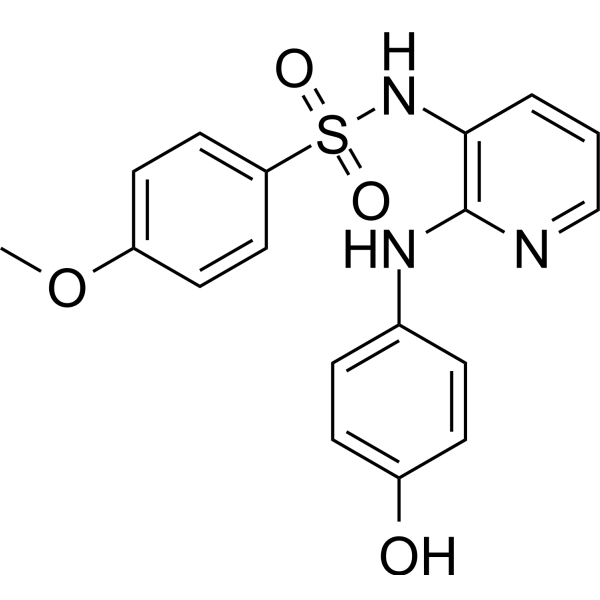
-
- HY-W190943
-
|
|
Drug-Linker Conjugates for ADC
|
Cancer
|
|
Azido-PEG4-Val-Cit-PAB-MMAE is a agent-linker conjugate for ADC by using the anti-mitotic agent, monomethyl auristatin E (MMAE, a tubulin inhibitor), linked via the cleavable linker Azido-PEG4-Val-Cit-PAB-OH . Azido-PEG4-Val-Cit-PAB-MMAE is a click chemistry reagent, it contains an Azide group and can undergo copper-catalyzed azide-alkyne cycloaddition reaction (CuAAc) with molecules containing Alkyne groups. Strain-promoted alkyne-azide cycloaddition (SPAAC) can also occur with molecules containing DBCO or BCN groups.
|
-
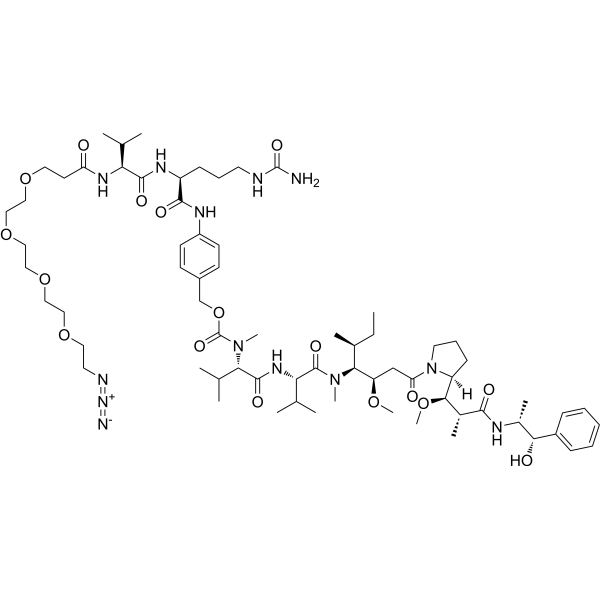
-
- HY-13627
-
|
|
Microtubule/Tubulin
Apoptosis
|
Inflammation/Immunology
Endocrinology
Cancer
|
|
Estramustine phosphate sodium, an estradiol analog, is an orally active antimicrotubule chemotherapy agent. Estramustine phosphate sodium depolymerises microtubules by binding to microtubule associated proteins (MAPs) and/or to tubulin. Estramustine phosphate sodium can interfere mitosis, trigger cell death and induce apoptosis, which can be used for the research of cancer like prostate cancer .
|
-
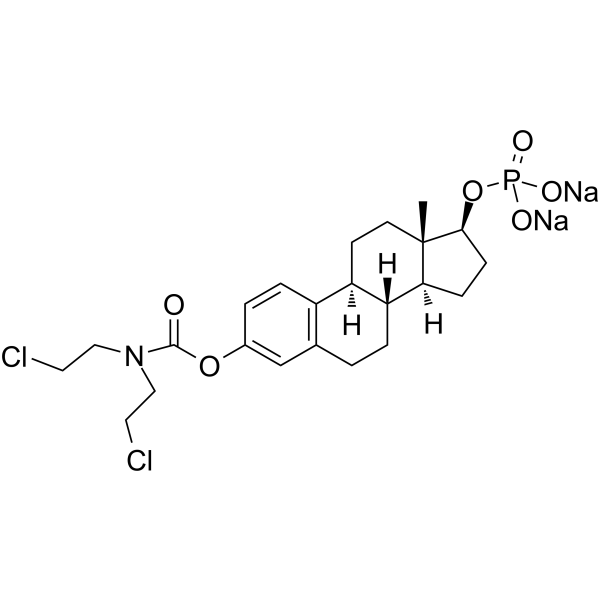
-
- HY-13627A
-
|
|
Apoptosis
Microtubule/Tubulin
|
Inflammation/Immunology
Endocrinology
Cancer
|
|
Estramustine phosphate, an estradiol analog, is an orally active antimicrotubule chemotherapy agent. Estramustine phosphate depolymerises microtubules by binding to microtubule associated proteins (MAPs) and/or to tubulin. Estramustine phosphate can interfere mitosis, trigger cell death and induce apoptosis, which can be used for the research of cancer like prostate cancer .
|
-
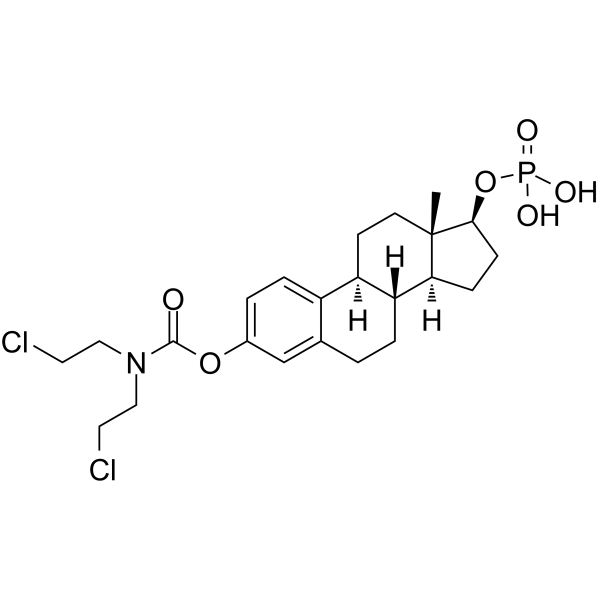
| Cat. No. |
Product Name |
Target |
Research Area |
-
- HY-15580
-
-
- HY-P1126
-
|
DLS 15
|
Microtubule/Tubulin
ADC Cytotoxin
Apoptosis
|
Cancer
|
|
Dolastatin 15 (DLS 15), a depsipeptide derived from Dolabella auricularia, is a potent antimitotic agent structurally related to the antitubulin agent Dolastatin 10. Dolastatin 15 induces cell cycle arrest and apoptosis in multiple myeloma cells. Dolastatin 15 can be used as an ADC cytotoxin .
|
| Cat. No. |
Product Name |
Target |
Research Area |
-
- HY-P99593A
-
|
DMUC5754A (solution)
|
Antibody-Drug Conjugates (ADCs)
|
Cancer
|
|
Sofituzumab vedotin (DMUC5754A) (solution) is an antibody-drug conjugate (ADC) that contains the humanized IgG1 anti-MUC16 monoclonal antibody and a potent anti-mitotic agent, monomethyl auristatin E (MMAE), linked through a protease-cleavable linker .
|
| Cat. No. |
Product Name |
Category |
Target |
Chemical Structure |
| Cat. No. |
Product Name |
Chemical Structure |
-
- HY-12053AS
-
|
|
|
Vinorelbine-d3 (ditartrate) is the deuterium labeled Vinorelbine ditartrate. Vinorelbine (ditartrate) is an anti-mitotic agent which inhibits the proliferation of Hela cells with IC50 of 1.25 nM.
|
-

-
- HY-15575S
-
|
|
|
VcMMAE-d8 is an isotope of VcMMAE (HY-15575). VcMMAE-d8 is a agent-linker conjugate for ADC with potent antitumor activity by using the anti-mitotic agent, monomethyl auristatin E (MMAE, a tubulin inhibitor), linked via the lysosomally cleavable dipeptide, valine-citrulline (vc) .
|
-

| Cat. No. |
Product Name |
|
Classification |
-
- HY-W190943
-
|
|
|
Azide
|
|
Azido-PEG4-Val-Cit-PAB-MMAE is a agent-linker conjugate for ADC by using the anti-mitotic agent, monomethyl auristatin E (MMAE, a tubulin inhibitor), linked via the cleavable linker Azido-PEG4-Val-Cit-PAB-OH . Azido-PEG4-Val-Cit-PAB-MMAE is a click chemistry reagent, it contains an Azide group and can undergo copper-catalyzed azide-alkyne cycloaddition reaction (CuAAc) with molecules containing Alkyne groups. Strain-promoted alkyne-azide cycloaddition (SPAAC) can also occur with molecules containing DBCO or BCN groups.
|
Your information is safe with us. * Required Fields.
Inquiry Information
- Product Name:
- Cat. No.:
- Quantity:
- MCE Japan Authorized Agent:


























































